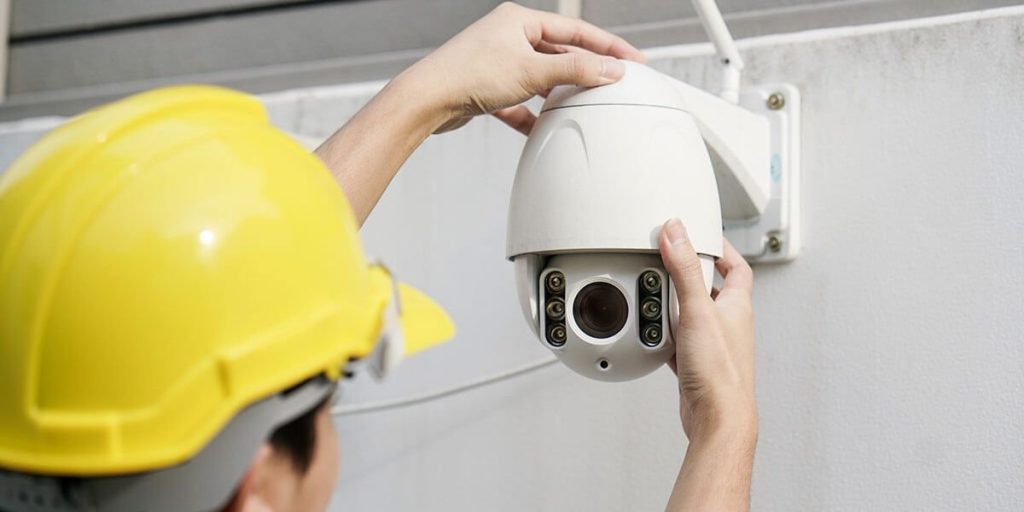The Big Apple is vibrant and densely populated; that is why locals are really concerned about their safety there. More and more people rely on CCTV to protect their homes, their loved ones, and their business properties against criminals. However, when you choose a video surveillance system, it is essential to figure out what type of real estate you are going to secure.
As experts from 718-USA-CCTV, a company providing security camera installation NYC, Brooklyn, and the other boroughs say, residential and commercial CCTV installations are based on different approaches; professionals have to consider many aspects, including purpose, design, scope, and implementation. So, let’s give both of them a closer look to see the best ways of protection for New York homes and commercial buildings.
Residential CCTV Installation in New York

Residential video surveillance systems include solutions tailored for apartments, individual homes, small residential complexes, and co-ops. The key goal for installers in this case is to help residents secure their property against break-ins and provide peace of mind to them.
The key characteristics of residential CCTV systems are the following:
- Limited scale and coverage. Video surveillance systems for homes and apartments usually consist of 4-8 cameras. Installers place them strategically to cover the most vulnerable points, such as entrances, driveways, hallways, and backyards. The components of residential CCTV are rather small and don’t need a lot of time and effort for mounting and setting.
- Ease of use. Today, user-friendliness is required from any technology, and security cameras are no exception. They often go with up-to-date features, such as motion-activated alerts, two-way audio, and mobile app services. Besides, manufacturers often develop kits for DIY indoor installation. However, the 718-USA-CCTV experts insist; if you want quality, professional services are a more reasonable option.
- Focus on Aesthetics and Discretion. Popular camera security brands work hard on the design of their models. Indoor devices are usually compact and low-profile; it allows them to blend into home interiors and exteriors without breaking the harmony of your environment.
- Flexible Storage Needs. As experts say, NVR or cloud-based solutions with 7-14 days of footage retention are quite enough for residential CCTV systems.
Finally, budget sensitivity is also the key concern for installers developing a video surveillance system for homes and apartments. Many homeowners prefer to compromise quality and choose cheaper 1080p or 2K camera models while professionals try to find more affordable solutions on the basis of more efficient 4K devices.
Commercial CCTV Installation in New York Boroughs
This type of video surveillance system serves for various kinds of business, including retail outlets, offices, warehouses, hotels, etc. They use hardware which is engineered for more demanding use; the CCTV is focused on liability reduction, compliance, employee monitoring, and utmost security.
Here are the key features of commercial security camera systems:
- Larger scale and broader coverage. It is quite natural that commercial property requires dozens and sometimes hundreds of cameras to secure all objects and separate zones. They are used for sales floors, parking lots, warehouses, etc.
- High-performance equipment. Businesses feel more comfortable when their properties and valuables are secured by powerful cameras offering superior resolution – as a rule, at 4K or higher. Besides, features like night vision and wide-angle lenses are a must in this case. Construction type also matters; that is why pan-tilt-zoom cameras are often involved in the CCTV security scheme.
- Advanced analytics and integration. Commercial video surveillance systems are usually connected to alarms, POS systems, facial recognition software, and access control, as well as to AI-based analytics. This approach allows business owners to track behavior of staff and consumers, identify suspicious patterns, and enhance security according to data delivered.
- Compliance with local laws. NYC businesses have to deal with many laws and regulations concerning privacy, labor, and data retention. Entrepreneurs are obliged to place signage in surveillance zones, do their best to secure footage against tempering, and adhere to industry-specific standards. The best solution in this case is to turn to installation experts who know how to design legally compliant CCTV security systems.
Besides, businesses prefer to sign contracts which set all necessary positions of customer service, including system upgrades, maintenance, and technical support. It is crucial for those who want to be sure of video surveillance reliability and professional assistance if something happens.
Residential and Commercial Video Surveillance – Short Comparison
In the table below, we outline the key differences between those CCTV for home and business premises. Now, you can see how such systems look and what professional installers usually deal with.
| Feature | Residential CCTV | Commercial CCTV |
| Typical Number of Cameras | from 2 to 8 | from 15 to 100+ |
| Primary Goals | Home protection, family safety | Loss prevention, liability, security |
| Installation Complexity | Basic to moderate | Complex, requires professional setup |
| System Integration | Basic (smart home) | Advanced (POS, access, analytics) |
| Legal Compliance | Basic | Mandatory and industry-specific |
| Storage Duration | 7–14 days | 30+ days |
| Monitoring Approach | Self-monitoring | Professional monitoring + centralized control |
| Budget Range | Low to mid | Mid to high |
Conclusion
Residential and commercial CCTV systems have something in common; they keep both people and property safe. However, design, functionality, and scalability of security cameras employed in both schemes is different. That is why turning to experts who can explain what you really need in your situation is the only reasonable solution.

